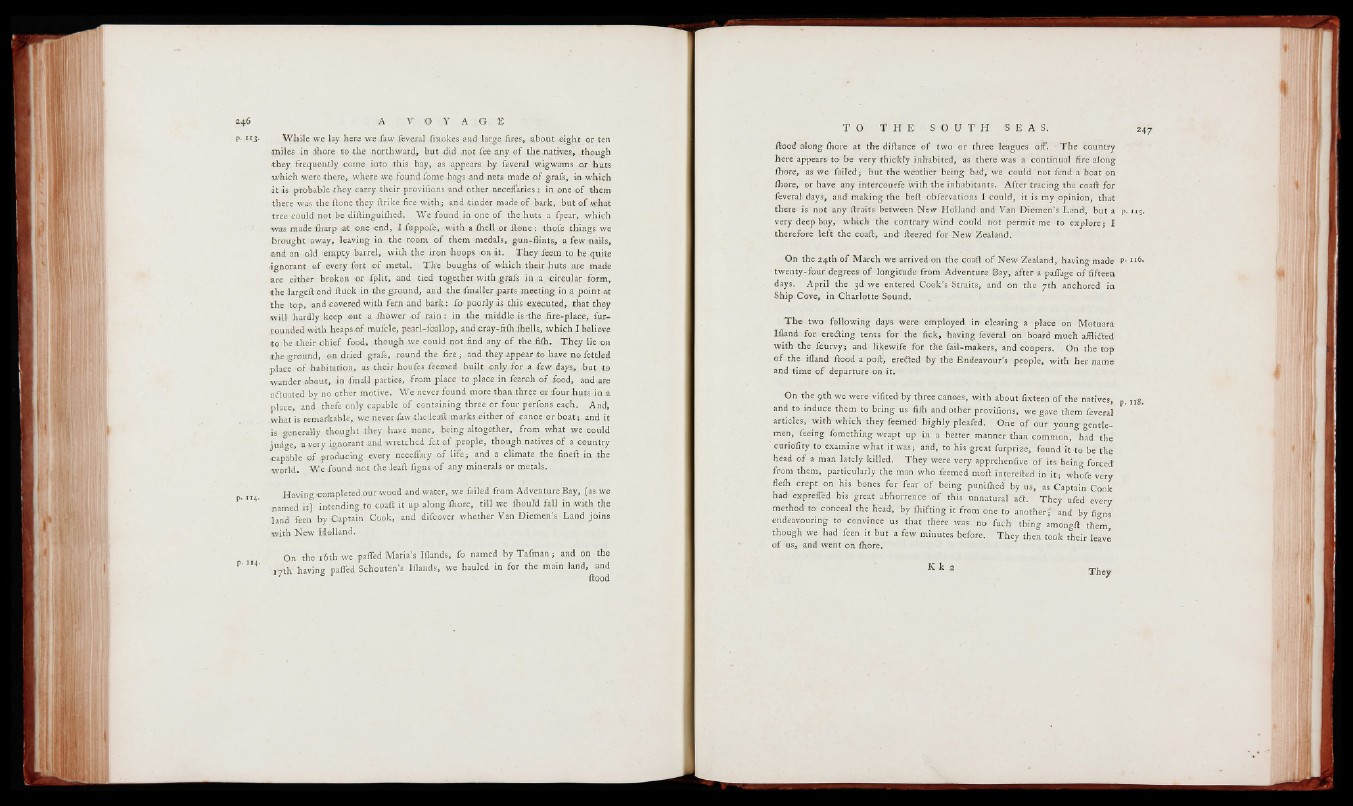
p. 113. While we lay here we flaw flev-eral fraokes and large fires, about -eight or ten
■miles in ¡£hore Co -the northward, but -did not fee any of the .nativ.es, though
they frequently .come into .this bay, as appears by feveral wigwams -or huts
which were there, where we found feme hags and nets made of g.rais, in .which
it is probable they carry their provifions and other neceiiariesin .©me -of »them
there was the ftone they ftrike fire with.; and tinder made of bark, but o.f .what
tree could not be diftinguiihed. We found in one of the huts a fpear, which
■was made flharp at one end, I fuppofle, -with a fheM or ftone: tbofle things we
brought away, leaving in .the room of them »medals, gun-flints, a few nails,
and an -old empty barrel, with the iron hoops on it. , They feem to he quite
ignorant of every fort .of metal. The -boughs of which their hvfts are made
are either broken or flpli-t, and tied together -with g-rafls in ta. -circular -form,
the largeftend ftuc-k in the ground, and the flmal-ler .parts meeting in a point at
the -top, and covered with fern and bark: fo poorly is -this executed, chat they
will hardly keep out a fhower o f rain : in the middle is the .fire-place, fur-
rounded with heaps-of mufcle, pearl-fcallop, and cray-filh flhells* which I believe
•to be their .chief food, though w,e could not find any of the fiih. They lie on
¡the ground,. on dried girraft, .round the fire; and they appear to have no fettled
place of habitation, as-their houfes feemed built only for .a -few days, but -to
wander «hont, in fmailJ parties, from place to place in fearoh of food, and are
actuated by no other motive. We never found more than three ax four huts i-n a
place, and thefe only capable of containing three or four perfons each. And,
w h a t is remaiika'ble, we never faw -the leasft marks either of canoe or boat; and it
is generally thought they -have none, -being -altogether, from what we ¡could
j udge, a v e r y ignorant-and-wretched fq tc f people, though natives o f a country
■capable of producing every neceflary of life; and a climate the fineft in the
world, l i e -found -not -the leaft figns -of any minerals or metals.
Having ¡completed-ounwood and water, we failed from Adventure Bay, |as we
* named it) in-tending.to eoaft it up along flhore, till we ihould fall in »with the
land feen by Captain Cook, and difcpver whether Van Diemen’s Land joins
with New Holland.
On the 16th we palled Maria’s Iilands, fo named by Tafman; and on the
P' 3 17th having patted Schouten’s Iflands, we hauled in for the main land, and
‘ ' ftood
ftood along ihore at the d'iftance of two or three leagues off. The country
here appears to be very thiekiy inhabited, as there was a continual fire along
Ihore, as we failed; but the weather being bad, we could not fend a boat on
ihore, or have any intercoiirfe with the inhabitants. After tracing the coaft for
feveral days, and making the beft obfervations I could, it is my,opinion, that
there is not any ftraics between New Holland and Van Diemen’s Land, but a p. 115.
very deep bay, which the contrary wind' could not permit me to explore; I
therefore left the coaft, and fleered for New Zealand.
On the 24th of March we arrived on the coaft of New Zealand, having made P*II6»
twenty-four degrees of longitude from Adventure Bay, after a pafflage of fifteen
days. April the 3d we entered Cook’s Straits, and on the 7th anchored in
Ship Cove, in Charlotte Sound.
The two following days were employed in clearing a place on Motuara-
Iftand for erefting tents for the lick, having feveral on board much afflifted1
with the fcurvy; and likewife for the fail-makers, and coopers. On the top
of the iiland ftood a poft, erefted by the Endeavour’s people, with her name
and time o f departure on it.
On the 9th we were vifited by three canoes, w,ith about fixteen of the natives, p. X1s.
and to induce them to bring us fiih and other provifions, we gave them feveral
articles, with which they feemed highly pleafed. One of our. young gentlemen,
feeing fomething wrapt up in a better manner than common, had the
curiofity to examine what it was; and, to his great furprize, found it to be the
head of a man lately killed. They were very apprehenfive of its being forced1
frdm them, particularly the man who feemed moft interefted in it; whofe very
fleih crept on his bones for fear of being puniihed by us, as Captain Cook
had expreCed his great abhorrence of this unnatural aft. They ufed every
method to conceal the head, by ihifting it from one to another; and by figns
endeavouring to convince us that there was no fuch thing amongft them
though we had feen it but a few minutes before. They then took their leav^
of us, and went on ihore.
They